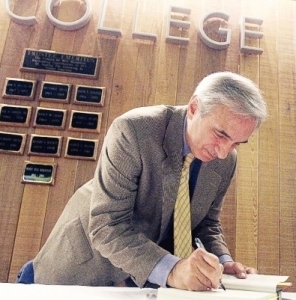Author: Church mistreats gays
By Dennis Hill
Published in News on March 14, 2012 1:46 PM

News-Argus/TROY HERRING
Jimmy Creech signs a copy of "Adam's Gift" at Wayne Community College Tuesday. The book was inspired by Creech's experience as a pastor in Duplin County.
Homosexuals ostracized by churches because of their sexual orientation suffer psychologically and spiritually because the one place they are taught they can turn to for acceptance no matter what has turned its back on them, says the author of a book on how formal religion persecutes gays and lesbians.
Jimmy Creech, a Goldsboro native who gained national attention when the Methodist Church stripped him of his minister's status for performing same-sex union ceremonies, spoke Tuesday night at Wayne Community College.
The event was sponsored by the League of Women Voters Book Club.
Creech, a graduate of Goldsboro High School, the University of North Carolina at Chapel Hill and Duke Divinity School, is the author of "Adam's Gift," a book about most churches' view of homosexuality and how that view has destroyed lives and driven many people away from God.
The Bible simply does not provide the evidence for the church's hatred of homosexuality, Creech told a gathering of about 100 people in Moffatt Auditorium.
In fact, the original doctrine of the church did not demonize homosexuality.
Little was known in ancient times about sexual orientation, Creech said. And it was only after the burgeoning Christian faith came into contact with Greek philosophy that the church became strongly against homosexuality.
The Greeks taught that there are two sides to life: the physical and the spiritual. Anything to do with the physical is inherently evil, Greek philosophers wrote. The result, Creech said, is that the church decided that sex itself was evil, except to procreate, and homosexuality was therefore an affront to God.
But the Bible teaches that God is loving and forgiving and for centuries people who are lesbian or gay have had to deal with the contradiction.
"They could not have taken us further from Jesus," Creech said.
Creech's book is based on an incident involving a man who came to him while he was pastor of a Duplin County church and confessed that he was a homosexual, and that because the church was adamantly against homosexuality, he was leaving the church. Creech said that until that moment he had not spent much time thinking about the issue.
But "Adam's" story caught his attention and led him to decide to work to correct what he eventually came to believe was wrong.
"I had been taught that homosexuals were depraved, immoral," Creech said. "But Adam did not fit any of those stereotypes. He broke all the stereotypes I had about homosexuals. All my stereotypes could not stand up to his integrity, his dignity."
He noted the case of another man who told him that he knew that God hated him because he was gay.
"He said that he had learned it in church and that nothing I could say to him would change his mind," Creech said. "He died believing God hated him."
It is not a case of gay and lesbian people outside the church looking in, Creech said. Gays and lesbians are already attending church, and many have done so all their lives.
"Gays grow up in the church. This is their home. That's why it hurts so bad when they feel rejected. They feel rejected by family," he said. "There are families in every church, there are individuals in every church, who are either lesbian or gay, or who have someone who is a member of their family who is.
"From the beginning, gay and lesbian people have been faithful servants of the church, many at a high cost."
Historically, the church has been wrong on many issues, Creech said -- the Bible has been used to justify wars, slavery and racism.
So he urged those in attendance to put their faith in God, not in a particular church or denomination.
Creech was asked why he remained in the Methodist Church even though it had defrocked him. He said that he believed he could do more good by staying a layman in the Methodist Church, rather than becoming a minister in a church that is more gay-friendly.
"I feel like what I have experienced gives me an important responsibility to help people understand the harm that is being done," he said.
Creech said that there has been some movement in recent years on the part of some denominations to be more accepting of homosexuals. Several now openly welcome gays, lesbians, bisexuals and transgender individuals.
"One day the church will welcome, embrace and affirm same-gender loving people," Creech said. "I am sure of it."
